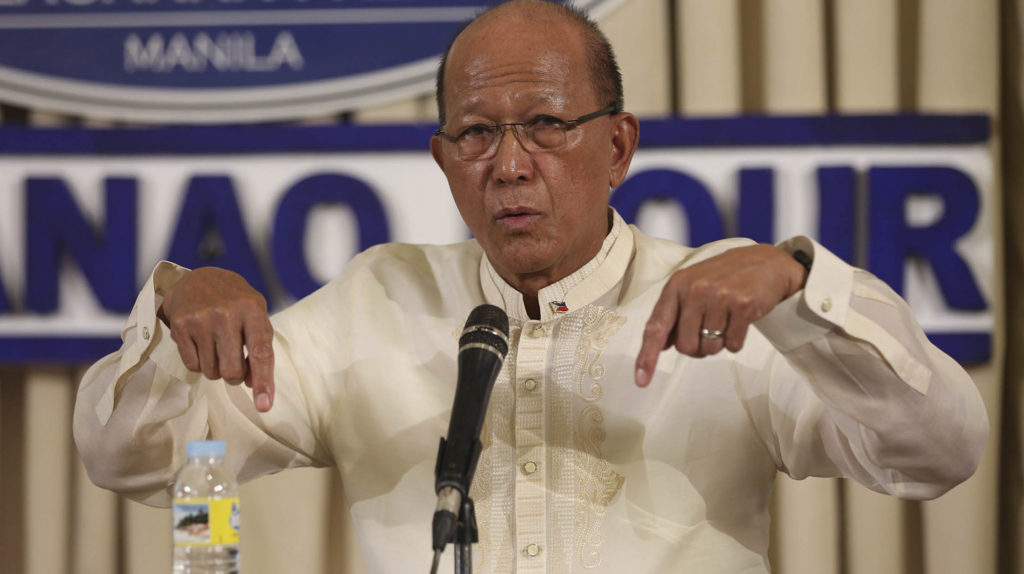Territorial defense a top priority among security issues— Lorenzana
As the Philippines faces an array of security threats, Defense Secretary Delfin Lorenzana described territorial defense as the “top priority” of the government.
“Ang pagtatanggol sa ating teritoryo ay nananatiling una sa aming mga prayoridad kaya naman patuloy kaming nagsusumisikap upang mas mabisa ang aming pagbabantay sa integridad at soberenya ng bansa,” he said in his Flag Day message in Malolos, Bulacan.
(Defending our territory remains to be the first in our priorities, so we are continuing to work hard to effectively guard the integrity and sovereignty of our country.)
The Philippines marked the first year of the Marawi crisis last week. The five-month gun battle between government forces and ISIS-linked terrorists was the country’s biggest security crisis in recent years.
“Ibang hamon na ang ating kinakaharap sa kasalukuyan—mga banta ng terorismo, malawakang pabago-bago ng panahon at pagkasira ng kalikasan, kahirapan, korapsiyon, paglaganap ng mga krimeng transnasiyonal at cybercrimes at agawan sa teritoryo,” Lorenzana said.
Article continues after this advertisement(We are now facing different kinds of challenges—threats of terrorism, extensive climate change and destruction of nature, poverty, corruption, proliferation of transnational crimes, cybercrimes, and grabbing of territories.)
Article continues after this advertisementAt the Philippine Navy anniversary last week, President Rodrigo Duterte announced that the second horizon of the modernization program has a budget of P77 billion for the Navy in the next five years.
But estimates from MaxDefense Philippines, a popular defense blog which releases information from DND insiders, say that the allocated budget is way below the original proposal of about P300 billion. This means the military supposedly had to cut down some of their requests which include submarines.
China has appeared to be bolder in defending its claims in the South China Sea in recent months, with the deployment of missiles, jamming equipment, and landing its bomber planes. But these waters are also claimed by the Philippines, Vietnam, Taiwan, Malaysia, and Brunei.
President Duterte chose to put aside the international court ruling in 2016, dismissing China’s sweeping claims in the South China Sea as illegal, in favor of economic gains from the Asian giant.
The Philippine government has not publicly condemned China’s activities in the disputed waters, saying they choose to bring it up during bilateral talks.
The Armed Forces of the Philippines said last week it is not abandoning its mandate in the West Philippine Sea, referring to the part claimed by the Philippines in the contested waterway.
“Ang mga pagsubok na ito ay nangangailangan ng sama-sama nating pagtugon. Bilang pagtupad sa aming mandato at sa sinumpaang tungkulin, ang kagawaran ng tanggulang pambansa ay patuloy na ipinattatanggol ang ating bayan at ang bawat Pilipino sa mga panlabas at panloob na panganib sa kapayapaa’t seguridad ng Pilipinas,” Lorenzana said.
(This challenge needs a concerted response. In order to accomplish our mandate and sworn duty, the Department of National Defense will continue to defend the country and each Filipino from outside and interior dangers to the peace and security of the Philippines.)
The defense chief also said they will also continue to be alert against threats to democracy and peace.
“Hindi namin hahayaang maghari ang ideyalismo ng poot at galit, bagkus susupilin namin ito upang kapayapaan at seguridad ang mangingibabaw,” he said.
(We won’t let hate and anger win, instead we will conquer them so that peace and security will reign.) /je
